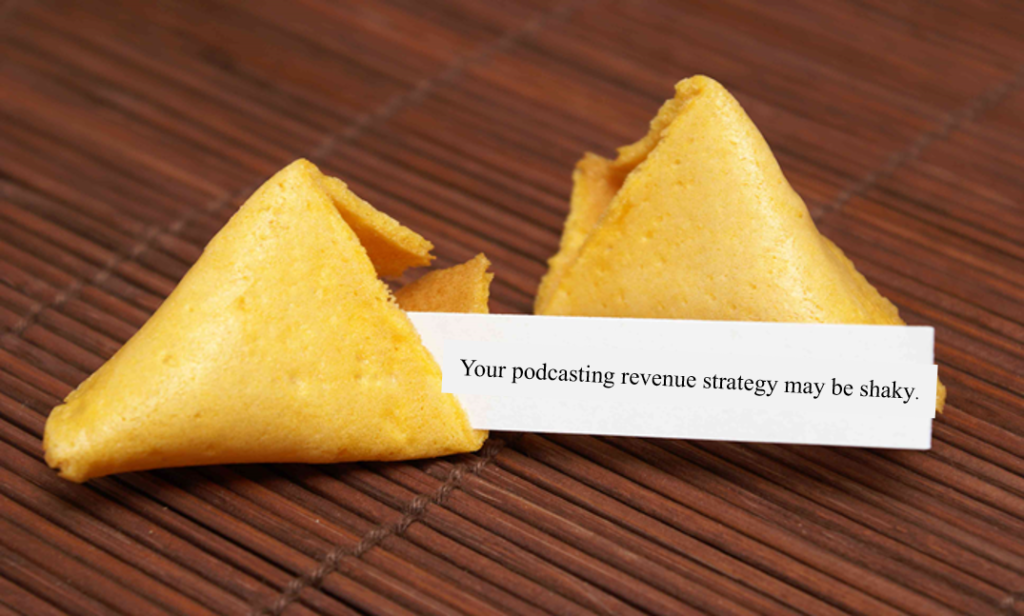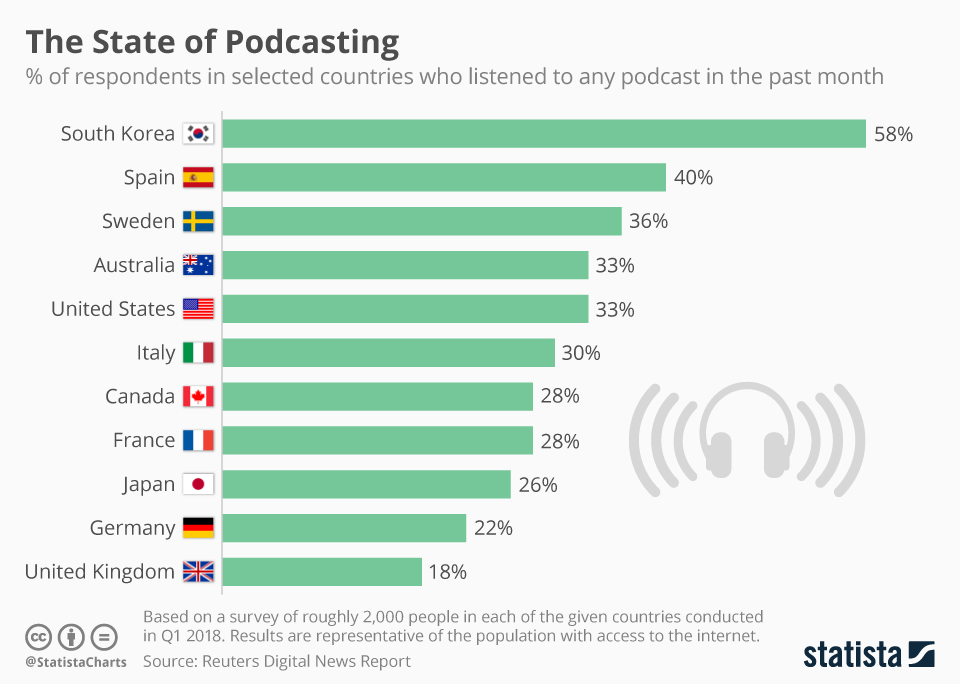
Yesterday's post talked about an apparent podcasting swoon – or is it just a temporary speed bump? I spoke with a number of people yesterday who had no shortage of opinions on this topic.
Those concerned about podcasting's future often point to monetization issues as one of the culprits that explains why some companies are questioning whether they should commit and invest to on-demand audio over the long haul.
To get a better understanding of podcasting revenue – and how it's generated – Marketplace looked at podcasting from a different point of view. They dove into the model that many Chinese podcasting content creators are working on in the space. Interesting, podcasting isn't highly popular in China – compared to what is taking place in other countries – especially South Korea. According to a Reuters study conducted earlier this year, one-third of U.S. consumers say they had listened to a podcast in the previous month. (Techsurvey 2018 puts that monthly level at 31% – consistent with Reuters' findings):

China doesn't appear on this list, apparently a country not even included in the Reuters research. Data from Libsyn, however, suggests that China is light years behind the U.S. when it comes to podcast consumption. (BTW: This is one of the problems in podcasting – everyone's numbers are different, making it difficult to confidently assess the present – and the future.)
Yet, Marketplace reports podcast revenue in China is north of $7 billion. In the U.S., it was $314 million last year. So, what do Chinese podcasting mavens know that we haven't figured out here in the country where podcasts first originated?
Simply put, U.S. podcasting revenue is primarily ad-based. In China, they mostly use a subscription model. It turns out a national research institute in China determined that what they call the “pay-for-knowledge economy” is worth billions of dollars, especially with podcasting content that offers useful knowledge, skill-building, and tools that can help make consumers successful in an increasingly competitive job market – as well as their growing society.
In China, it's about “buying information online” about any number of topics to help make people feel more confident about that their skill sets, preparing them for the next rung of the ladder, and helping get them ahead on the job and in life.

One of the Chinese podcasts mentioned in the Marketplace story is “How to Make Your Voice More Attractive.” It was created by a professor of broadcasting, Zheng Wei. He has more than 200,000 subscribers to a podcast aimed at white collar workers trying to get a leg up. The cost? Under $3.
Popular podcast topics differ widely between the two countries, underscoring key cultural differences. In the U.S., it's often comedy, music, technology, kids and family, and true crime. Chinese podcast fans gravitate to “Chinese poetry and history, self-growth, finance, business, and education.” That's what's known as a culture gap.
Obviously, the mindset in Beijing is quite a bit different than in Burlington, Baltimore, or Butte. And while smart, savvy information may be scarce in China, it's plentiful in the U.S. where so many more resources are widely available for free online.
Would Americans actually pay for lessons, teachings, and guidance from respected thought leaders?
Perhaps a look at the Master Class model is helpful. Consumers pay $180 annually for “all access” to cooking classes taught by Gordon Ramsay, Aaron Sorkin pontificating on  screen writing, Steve Martin presiding over the comedy curriculum, and Bob Woodward lecturing on journalism. It doesn't get any more “expert” than that.
screen writing, Steve Martin presiding over the comedy curriculum, and Bob Woodward lecturing on journalism. It doesn't get any more “expert” than that.
These classes leverage the celebrity of their famous “instructors.” The jury is still out on whether people will pay for classes/videos delivered in on-demand form from some of the best known content creators.
And that's not far afield from where podcasting sits right now. Today's ad-driven model may, in fact, turn out to be successful in the long run. But dynamically inserted produced ads, live reads, and sponsorships are pretty “old school” ways of monetizing audio content – and have become shopworn, tired, and repetitive on AM and FM stations.
Maybe it's the second quarter for podcasting, and we have a lot of game left. We may find out there are many ways to approach podcasting creation and monetizaation that may not resemble what's been done to date. We've talked about branded podcasts in this blog before, a different way for radio companies to participate without having to create compelling, original content.
The Chinese model suggests there are different approaches that might open new financial doors for podcasting. Americans are paying billions to subscribe to music playlist services, streaming video platforms, and satellite-delivered “radio.” Would they pay subscription fees for truly great podcasts?
That's what they were thinking at Audible (owned by Amazon) just a couple of short years ago. Did the model not work, was it the content, or something else?
There are more questions than answers about podcasts, whether they're about measurement, monetization, discovery, or content creation. But if the concept of audio on-demand becomes as mass appeal as video streaming, there will be enough money to go around for many podcast producers.
That doesn't mean we'll listen to anything. Netflix will invest a reported $12-13 billion this year toward the creation of video content – more than any other television-like network or platform. It requires substantial investment to buy (or acquire) shows like “Ozark” and the many others we're addicted to on Netflix.
As the stakes inevitably rise for quality podcasts, re-purposed morning shows, mind-numbing interview shows, and other paint-by-numbers podcasts just won't cut it. Radio, in particular, will not be able to mail this one in.
Success in this space will require dedicated, qualified personnel, research, investment, strategy, and innovative thinking.
It will be fascinating to see who is willing to ante up.
That old Chinese proverb – “May you live in interesting times” – continues to ring true.
- Get Your Free Radio Ads? Take It To the Bank! - April 19, 2024
- You've Got A Face For Radio - April 18, 2024
- What's Your Radio Station's Response To AI? - April 16, 2024





I feel like such a luddite to say this but, after reading every blog about podcasting these past months (and mostly biting my virtual tongue and not responding, hoping to be wrong), I remain unconvinced of the need for radio broadcasters to embrace it. Sure, there are exceptions–NPR is almost by design a perfect fit–but for most, I see little value beyond making popular over-the-air content available on-demand, so listeners can hear it again or share particularly fun segments with friends and family. (Think James Cordell’s wildly successful “Carpool Karaoke” with Paul McCartney segment. How many shares has that received on social media?)
I think the main reason I don’t see it is indeed because of the arguments FOR it. Almost all the blogs cite the success of on-demand TV for why radio needs to jump in headlong. But how successful has on-demand TV been for television BROADCASTERS?? Yes, Netflix has swooped in with unheard of success and is slowly vanquishing it’s over-the-air competitors. But ask the execs at NBC, CBS, ABC and FOX whether NETFLIX’S success with on-demand video has translated into on-demand success for THEM! In fact, I think you’ll find broadcasters–not content creators and providers like Netflix–have suffered greatly BECAUSE of on-demand video, rather than thriving from it.
A few weeks ago, one blog said radio should be creating podcasts because “sound creation” is what we do best. (Something to that effect.) I thought that’s ridiculous! You may as well say radio broadcasters should be forming rock and roll bands because playing rock and roll music is what we do best! No, I think what radio does best is…let’s call it “gift-wrapping.” We don’t “create” the latest chart-topping music, but we take that music and add quality, interesting, compelling, funny announcers and information the audience is interested in (the gift-wrapping) and THEN deliver that chart-topping song in the hopes that when a listener has a half-dozen other stations to choose from–along with countless other ways–to hear that same song, they will come to US, that we presented that song in the most appealing manner. And no, that just doesn’t lend itself to being made available “on-demand.” I promise, no one will listen to a podcast some evening to hear the weather report from 7 that morning.
I’m a radio lover through and through so again, I’m more than happy to be wrong if it means success for the medium. But for now, with the rare exceptions mentioned above, I remain unconvinced. Just ask our brothers in TV broadcasting at NBC, CBS, ABC and FOX.
Ok, back to biting my virtual tongue on this topic, I promise.
Look at what they have done at ESPN and ESPN+, They are charging $4.99 a month to provide unique content that is not available over the airwaves. Since it started five months ago they have 1 Million subscribers. That is $5 Million in 5 months.
The Key is creating more niche content and using the free “Radio” to promote what they are creating and making available as a premium.
I’m willing to bet in your community that there is something that people care about that they would be willing to pay a nominal fee to get more access to it.
I’m a morning show guy and they’ve always taught us to tease ahead… Forward momentum. The same could be done with podcasts.
-Take the most compelling 30 seconds of your podcast.
-Advertise it on air for free, and attach a subscription/or sponsor (or even better both) to justify the production costs.
– The people that are interested will pay for it.
This is exactly what the Chinese and ESPN are doing.
The problem is radio and broadcast companies want the guarantee BEFORE they invest.
ABC, CBS, NBC and FOX unfortunately had to get their ass kicked by the guarantee in the form of Netflix and other streaming services.
This is what NPR is doing to traditional terestrial radio.
They were willing to invest.
Good insights, Jeff, I appreciate it. I came very close to not writing my response, and in fact had even closed the blog and decided to just “move on” with work when I found it still nagging at me and came back to write what I did, deciding that, “If I’m thinking this, others must be, too, and if I’m missing anything in these thoughts, I want others to have the chance to make me better informed.” You did just that and I do appreciate it. David Manzi
I have come to detest thte question, “So, if we do this, how are we going to monetize it.” That’s the wrong order. Studying how Amazon did it is a great exercise.
Really solid article Fred, thank you for sharing this. I’ve been thinking a lot about it lately and still kind of fascinated by how things are moving in the podcast space. In particular it’s veeerrry slow adoption in the beginning and then a later resurgence. I think there are a number of business models out there worth talking about for this particular kind of content creation. Appreciate your research and insight into this! Thanks!
Thanks, Tanya. It is healthy to explore other monetization model at this still early point on the podcasting curve. Thanks for the comment.
Interesting point about the different measurements. It shows a difference in perception by the market themselves. I live in the region and most people, not just the Chinese, are constantly up-skilling themselves (if there is such a word).
PS I believe that proverb is a curse : )